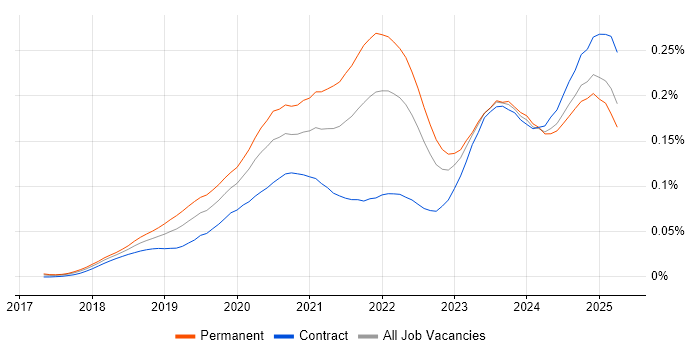PyTorch
UK
The table below provides summary statistics and salary benchmarking for jobs requiring PyTorch skills. It covers permanent job vacancies from the 6 months leading up to 4 March 2026, with comparisons to the same periods in the previous two years.
| 6 months to 4 Mar 2026 |
Same period 2025 | Same period 2024 | |
|---|---|---|---|
| Rank | 498 | 568 | 657 |
| Rank change year-on-year | +70 | +89 | +218 |
| Permanent jobs citing PyTorch | 179 | 118 | 166 |
| As % of all permanent jobs in the UK | 0.25% | 0.26% | 0.21% |
| As % of the Libraries, Frameworks & Software Standards category | 2.28% | 1.18% | 0.92% |
| Number of salaries quoted | 78 | 59 | 118 |
| 10th Percentile | £54,250 | £42,500 | £45,750 |
| 25th Percentile | £57,500 | £60,000 | £55,000 |
| Median annual salary (50th Percentile) | £75,000 | £80,000 | £70,000 |
| Median % change year-on-year | -6.25% | +14.29% | -6.67% |
| 75th Percentile | £95,000 | £97,500 | £96,875 |
| 90th Percentile | £115,000 | £113,000 | £139,000 |
| UK excluding London median annual salary | £67,500 | £67,500 | £62,500 |
| % change year-on-year | - | +8.00% | +8.70% |
All Software Libraries and Frameworks
UK
PyTorch falls under the Software Libraries and Frameworks category. For comparison with the information above, the following table provides summary statistics for all permanent job vacancies requiring technical specification, industry standards, software libraries and framework skills.
| Permanent vacancies with a requirement for technical specification, industry standards, software libraries and framework skills | 7,846 | 10,042 | 18,030 |
| As % of all permanent jobs advertised in the UK | 11.01% | 22.04% | 22.92% |
| Number of salaries quoted | 5,768 | 6,492 | 14,547 |
| 10th Percentile | £37,500 | £39,025 | £37,500 |
| 25th Percentile | £50,000 | £51,250 | £46,250 |
| Median annual salary (50th Percentile) | £65,000 | £66,219 | £60,000 |
| Median % change year-on-year | -1.84% | +10.37% | -11.11% |
| 75th Percentile | £85,000 | £86,250 | £80,000 |
| 90th Percentile | £106,580 | £110,000 | £100,000 |
| UK excluding London median annual salary | £60,000 | £60,000 | £55,000 |
| % change year-on-year | - | +9.09% | -4.35% |
PyTorch
Job Vacancy Trend
Historical trend showing the proportion of permanent IT job postings citing PyTorch relative to all permanent IT jobs advertised.

PyTorch
Salary Trend
Salary distribution trend for jobs in the UK citing PyTorch.

PyTorch
Salary Histogram
Salary distribution for jobs citing PyTorch over the 6 months to 4 March 2026.
PyTorch
Top 15 Job Locations
The table below looks at the demand and provides a guide to the median salaries quoted in IT jobs citing PyTorch within the UK over the 6 months to 4 March 2026. The 'Rank Change' column provides an indication of the change in demand within each location based on the same 6 month period last year.
| Location | Rank Change on Same Period Last Year |
Matching Permanent IT Job Ads |
Median Salary Past 6 Months |
Median Salary % Change on Same Period Last Year |
Live Jobs |
|---|---|---|---|---|---|
| England | +8 | 139 | £75,000 | -6.25% | 316 |
| London | +67 | 94 | £77,500 | -13.89% | 121 |
| Work from Home | +23 | 46 | £77,500 | +14.81% | 151 |
| UK excluding London | -10 | 45 | £67,500 | - | 236 |
| East of England | +8 | 16 | £75,000 | - | 57 |
| North of England | -33 | 10 | £67,500 | -12.90% | 36 |
| North West | -2 | 9 | £65,000 | -23.76% | 17 |
| Midlands | -6 | 7 | £55,000 | +83.33% | 23 |
| South East | -19 | 7 | £67,500 | - | 65 |
| West Midlands | +14 | 4 | £55,000 | +83.33% | 11 |
| South West | -21 | 3 | £90,000 | +100.00% | 37 |
| East Midlands | - | 3 | £70,000 | - | 12 |
| Scotland | -10 | 1 | £100,000 | +17.65% | 9 |
| Northern Ireland | -28 | 1 | - | - | 5 |
| Yorkshire | -42 | 1 | £71,000 | +1.43% | 17 |
PyTorch
Co-Occurring Skills & Capabilities by Category
The following tables expand on the one above by listing co-occurrences grouped by category. They cover the same employment type, locality and period, with up to 20 co-occurrences shown in each category:
|
|
||||||||||||||||||||||||||||||||||||||||||||||||||||||||||||||||||||||||||||||||||||||||||||||||||||||||||||||||||||||||||||||
|
|
||||||||||||||||||||||||||||||||||||||||||||||||||||||||||||||||||||||||||||||||||||||||||||||||||||||||||||||||||||||||||||||
|
|
||||||||||||||||||||||||||||||||||||||||||||||||||||||||||||||||||||||||||||||||||||||||||||||||||||||||||||||||||||||||||||||
|
|
||||||||||||||||||||||||||||||||||||||||||||||||||||||||||||||||||||||||||||||||||||||||||||||||||||||||||||||||||||||||||||||
|
|
||||||||||||||||||||||||||||||||||||||||||||||||||||||||||||||||||||||||||||||||||||||||||||||||||||||||||||||||||||||||||||||
|
|
||||||||||||||||||||||||||||||||||||||||||||||||||||||||||||||||||||||||||||||||||||||||||||||||||||||||||||||||||||||||||||||
|
|
||||||||||||||||||||||||||||||||||||||||||||||||||||||||||||||||||||||||||||||||||||||||||||||||||||||||||||||||||||||||||||||
|
|
||||||||||||||||||||||||||||||||||||||||||||||||||||||||||||||||||||||||||||||||||||||||||||||||||||||||||||||||||||||||||||||
|
|
||||||||||||||||||||||||||||||||||||||||||||||||||||||||||||||||||||||||||||||||||||||||||||||||||||||||||||||||||||||||||||||
|
|||||||||||||||||||||||||||||||||||||||||||||||||||||||||||||||||||||||||||||||||||||||||||||||||||||||||||||||||||||||||||||||
